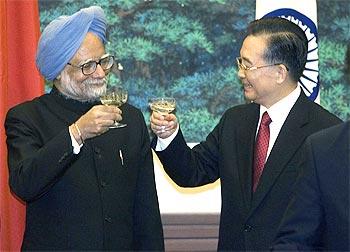New Delhi: Despite international calls for lowering tension in the region, temperatures continued to rise with India slamming both China and Pakistan on Wednesday. In four statements, the government gave enough indication that Chinese provocations will not go unanswered, with the ministries of external affairs, home, finance and defence coming into the picture.
In apparent retaliation to Chinese criticism of prime minister Manmohan Singh's visit to Arunachal Pradesh earlier this month, the ministry of external affairs warned Beijing against going ahead with its massive hydel projects in Pakistan-occupied Kashmir (PoK). So far, the protests against China's $1.5 billion investment plans in PoK have been directed at Pakistan. This may be the first time China is being warned directly.
At another interaction, the vice-chief of the Indian Air Force, Air Marshal PK Barbora, quietly brought out the T-word: Tibet. Barbora talked about Chinese buildup in Tibet and suggested they had no business talking about India's infrastructure upgradation in the border areas.
"I haven't said anything about the Chinese having constructed any airfields on their side in the Tibet area. I don't think they should say anything about our construction or improvement in infrastructure in the north-east or in the Ladakh area," Barbora said on the sidelines of a function to launchjoint India-Oman air force exercises.
On another occasion, finance minister Pranab Mukherjee rubbished China's objections to Manmohan Singh's visit to Arunachal. The prime minister had a constitutional right to do so as the state was an "integral part" of India, he said. "I too visited Arunachal Pradesh for campaigning and considered it as a legitimate right. It's proper action on our part," he added.
Home minister P Chidambaram, on a visit to Kashmir, slammed Pakistan, saying that terrorism in the valley was directly related to infiltration from across the border. "One can see a desperation on the part of Pakistan and PoK authorities to infiltrate into India," he told reporters. The home minister also ruled out business visas for Chinese workers and said they would have to go for employment visas. "We do not need semi-skilled or unskilled workers from China. We have enough workers in India", he said.
China, for its part, continued its verbal attacks, with The People's Daily, the Communist party mouthpiece, accusing India of "hegemonic" ambitions in South Asia and "provoking" China over the border dispute. "If India really wants to be a superpower, such a policy is short sighted and immature," the editorial said.
Analysts in Delhi saw the flurry of strong statements on Wednesday as a tit-for-tat response to China's repeated efforts to flag Arunachal Pradesh as disputed territory. But they also felt that the government was responding to domestic voices, particularly the BJP's, which have been hitting out at India's "soft'' reaction to unending provocations from China and Pakistan.
On Wednesday, BJP spokesperson Ravi Shankar Prasad attacked the government for adopting a "soft tone and tenor'' towards China and described its responses as "timid''.
Keeping its domestic constituency in mind, the government appears to have made a dramatic and well-thought-of turnaround in strategy. For it was not just the foreign office that protested on Wednesday, but also the home minister, the finance minister and the air force brass.
But Tibet is India's trump card and much will depend on how New Delhi finally uses this. Those who want India to take a tough stand on Tibet believe that the only way to do so would be to support Tibetan independence from China, or suggest greater autonomy within. The problem is India has always recognised Tibet as a part of China.
China has already protested the Dalai Lama's visit to Arunchal Pradesh next month. But India appears unperturbed. The Dalai Lama's office on Wednesday confirmed the dates for the week-long trip from November 8-15. The Tibetan leader will fly to Tawang on November 8 and remain in the monastery town till the morning of the 12th. That afternoon he will travel to Bomdila, which was overrun by the People's Liberation Army in the 1962 war. The Dalai Lama will be there for two nights for spiritual teachings and a lecture and leave for Itanagar, the capital of Arunachal, on the 14th. He will take a flight back to Delhi on the 15th.
The visit is sure to escalate tensions with China. Analysts believe that the intemperate language used by the Chinese foreign office spokesman against the prime minister on Tuesday was triggered by anxiety and anger over the Dalai Lama's journey to Tawang, the monastery town the Chinese claim on behalf of the Tibetans.
In fact, a major roadblock in the boundary talks between the two countries is Tawang.
China, meanwhile, continued to ratchet up its animosity to India.

